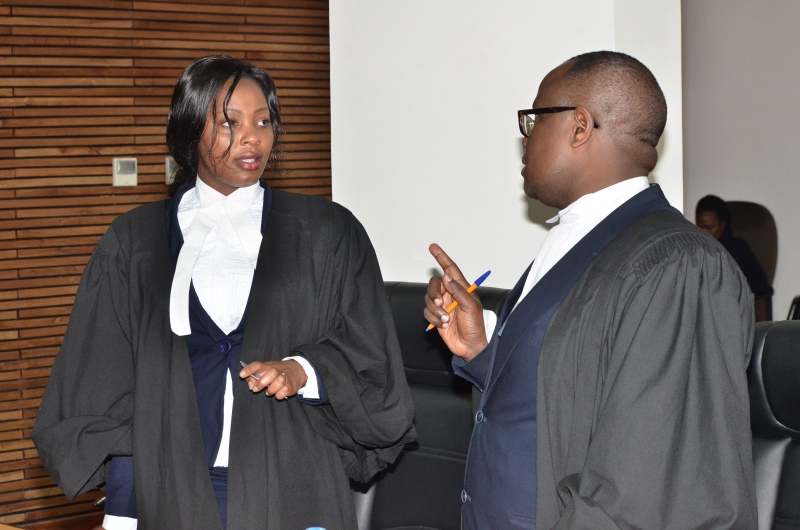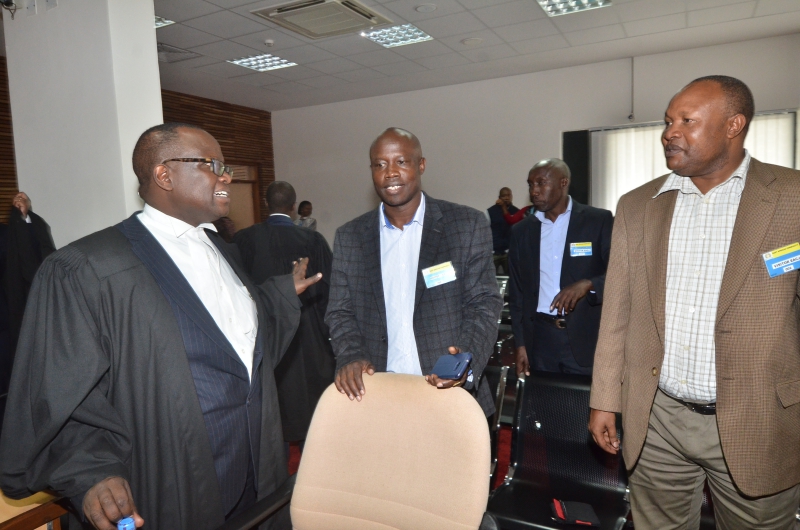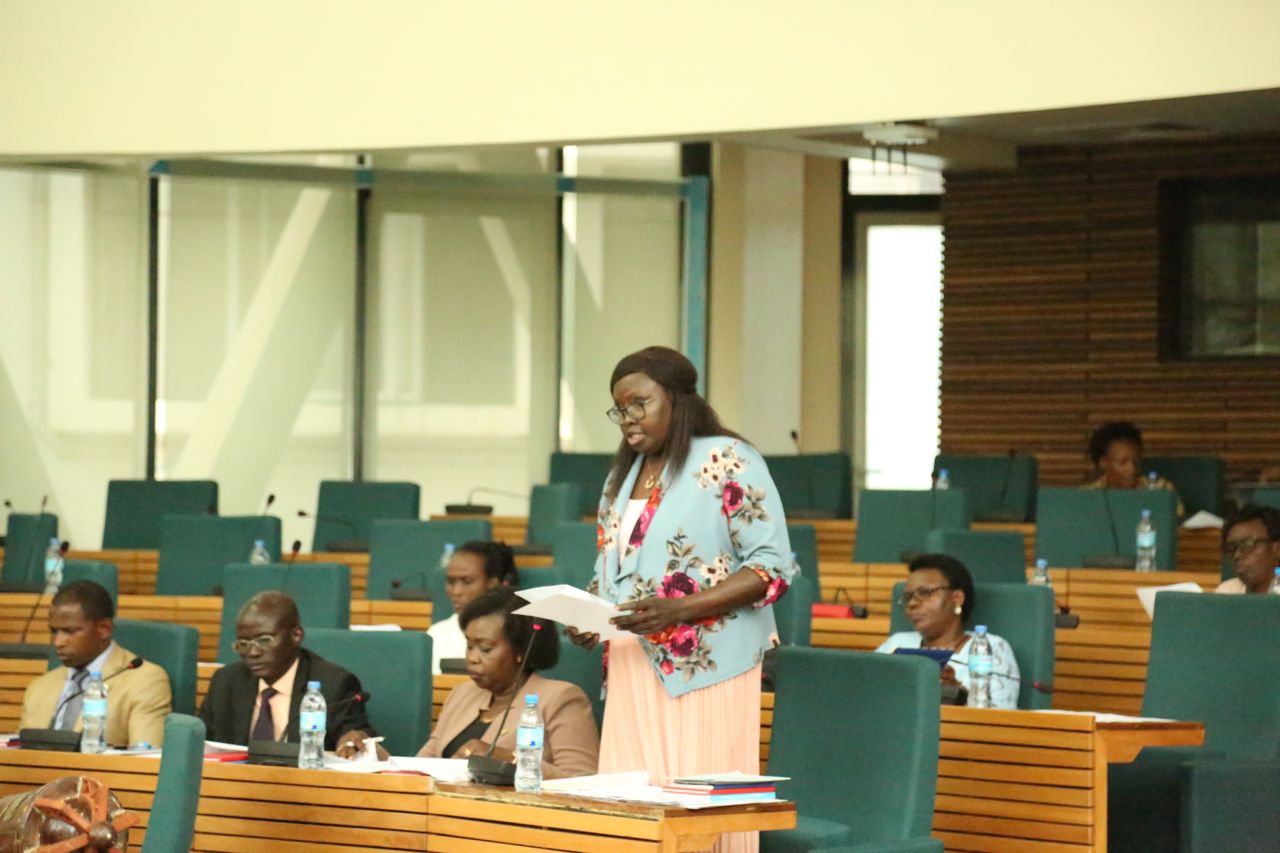
Posted in Press Release
East African Court of Justice, Arusha, 30th September, 2018: The First Instance Division dismissed Dr Mpozayo Christophe’s Case against the Government of Rwanda over his arrest, detention, prosecution conviction and sentencing for the offence of inciting insurrection amongst the population for being in possession of ammunition. The Applicant, who is a Rwandan Citizen and former Staff of the Community in the East African Legislative Assembly (EALA), was seeking Court orders to declare that the government infringed the fundamental Principles of the Community as well as Rwandan Laws.
In ruling Court held that it is not satisfied by the Applicant that Criminal Case No.RP0017/14/HC/KIG was conducted against universally accepted principles of law, therefore declaration against his arrest, detention, trial and imprisonment being unlawful was declined.
Further Court said that the Applicant has not proved violation of the principles of law enshrined in Articles 6(d) and 7 (2) or the Treaty, hence Court not satisfied and declined to declare that the Republic of Rwanda violated the EAC Treaty and principles of good governance and rule of law as well as his conviction was unlawful as sought by the Applicant.
In addition Court considered that granting orders that the sentence imposed on the Applicant in Criminal Case No.RP0017/14/HC/KIG and be set aside as well as an order that the Applicant’s conviction be hereby set aside, would be tantamount to exercise an appellate jurisdiction over national courts, which jurisdiction the court is not clothed with, hence such orders sought declined to be granted.
On the prayer Court to award general damages to the Applicant, the Court said that it may award general damages in an appropriate case, however, in this case, it we are unable to do so because the Applicant has not proved his claims in his Reference hence prayer was declined. Similarly, Court found no basis to award aggravated and exemplary damages as sought by the Applicant, having not succeeded in his case.
Furthermore, Court noted that, the Applicant in his Written Submissions raised a claim for his unpaid monthly earning. Court retaliated that, such a claim is akin to a claim for special damages and that it is according to the law, that specific damages must be pleaded and proved. That In this case, they were not pleaded. In any event, the Applicant has not even succeeded in the Reference, hence the prayer was disallowed.
In conclusion, the Court said that, with regard to the prayer for costs, as stated in Rule 111(1), costs follow the event unless the Court for good reasons otherwise orders. In this case, the Applicant having failed to prove his claims under this Reference, he would not be entitled to costs. Ordinarily, he should be subjected to pay costs to the Respondent. However, the Court is aware that the Applicant could not afford to engage a lawyer to represent him initially and that the ones that represented him subsequently were doing so under a legal aid brief by the East African Law Society. In the circumstance, it is in the interest of justice that each party bears its own costs.
The Lawyer representing the Applicant, after the Judgment was delivered, he requested Court to provide him with the copies of the pleadings and the Judgment to enable him Appeal to the Appellate Division.
The Judgment was delivered by Honorouble Lady Justice Monica Mugenyi, (Principal Judge), Justice Isaac Lenaola (Deputy Principal Judge), Justice Dr Faustin Ntezilyayo, Justice Fakihi Jundu, and Justice Audace Ngiye
The Applicant was represented by Mr Joel Kimutai Bosek an Ms Moureen Okoth whilea the Respondent was represented by Counsel Arnest William holding brief for Nicholas Ntarugera Counsel for the Respondent AG Rwanda
Notes for Editors:
The Applicant underwent two different cases for two different charges or offences. In the first trial, he was arrested, detained, prosecuted, found innocent, acquitted and was accordingly released, while in the second trial he was arrested, detained, prosecuted, found guilty, convicted and sentenced to ten (10) years imprisonment.
In the first criminal case, the Applicant was arrested on 8th November, 2013, detained and charged with the offences of defamation, insulting a person in a private area, conspiracy against the Government of Rwanda and being in illegal possession of arms (a grenade). He was acquitted of the charges on 31st March, 2014 and released on 2nd April, 2014.
In the second criminal case, the Applicant was arrested on 2nd April, 2014, detained and charged with a different offence to wit inciting insurrection or trouble amongst the population. The Applicant was tried on the said offence and on 8th April, 2015 was found guilty, convicted and sentenced to ten (10) years imprisonment.
The Skype Chat documents, the WhatsApp conversation between the Applicant and one Munyampeta Jean Damascene was discovered in his seized laptop and produced before the trial court as evidence in the case against him of inciting insurrection or trouble amongst the population and the same were discovered after issuance of the decision to intercept the relevance communication and correspondence by the National Prosecutor, one Ruberwa Bonaventure on 25th October 2013.
ENDS
For more information, please contact:
Yufnalis Okubo
Registrar
East African Court of Justice
Arusha, Tanzania
Tel: +255 27 2162149
mail: Okubo [at] eachq.org
www.eacj.org
About the East African Court of Justice:
The East African Court of Justice (EACJ or ‘the Court’), is one of the organs of the East African Community established under Article 9 of the Treaty for the Establishment of the East African Community. Established in November 2001, the Court’s major responsibility is to ensure the adherence to law in the interpretation and application of and compliance with the EAC Treaty.
Arusha is the temporary seat of the Court until the Summit determines its permanent seat. The Court’s sub-registries are located in the respective National Courts in the Partner States.

Posted in Press Release
East African Court of Justice Arusha, 30th September, 2018: The First Instance Division declined to grant Ex parte orders (orders given in the absence of the party against) in the Application filed by One Prof Paul Kiprono Chepkwony seeking Court orders to direct the government of Kenya to provide temporary school facilities to enable pupils pursue their education for the national examination (Kenya Certificate of Primary Education), whose schools were closed or destroyed by the government agents. The Applicant filed this Application for the mentioned orders pending the determination of the Inter parte Application (between two parties).
The Court in its Ruling said that in the absence of evidence of the current status quo in the matter before us, as well as to avoid the unnecessary eventuality of issuing superfluous orders in that regard; the court refrained from issuing the Orders sought without giving the Respondent the opportunity to be heard.
Court further said that, status quo of the matter is, after hearing from the Applicant that no arrangements whatsoever had been made by the Government of Kenya to ensure the continuity of the affected minors’ education, no supportive evidence was furnished to Court as would lend credibility to this contention. That documentary evidence indicative of the Respondent’s refusal or omission to ensure the said continuity would have been pertinent in that regard.
In addition, the Court noted that as an organ of the Community, the Court is also enjoined to observe the principles of the Community in actualization of its mandate. Thus, under Article 23(1) of the Treaty the Court is enjoined to ensure ‘adherence to the law’ in the execution of its mandate, as it was correctly submitted by Counsel for the Applicant, that Partner States are enjoined to observe the principles in Article 6(d) of the Treaty in pursuit of the objectives of the East African Community.
However, Adherence to the law in that regard necessarily entails giving due regard to the principles of fair trial and due process in the promotion of the rule of law. Quite obviously, the dictates of fair trial, due process and natural justice would require that all parties to a dispute are heard before a decision in respect thereof is made. The only exception to this cardinal judicial practice would arise in deserving cases as captured in Rule 21(2) of our Rules.
Court to grant Interim Orders is generally governed by Article 39 of the Treaty, which provides that; “The Court may, in a case referred to it, make any interim orders or issue any directions which it considers necessary or desirable. Interim orders and other directions issued by the Court shall have the same effect as interim as decisions of the Court.” The Court added that legal provision does not draw any distinction between ex parte and inter parte applications thereof. Also it stated that, provision for such applications to be heard ex parte is enclosed in Rule 21(2) of the Court’s Rules of Procedure for deserving cases. The Rule provides that “No motion shall be heard without notice to the parties affected by the application. Further, that provided, however, that the First Instance Division, if satisfied that the delay caused by proceeding in the ordinary way would or might entail irreparable injustice, may hear the motion and make an ex parte order upon such terms as to costs or otherwise, and subject to such undertaking, if any, as the Division deems just.
In addition, Court said that after hearing carefully the Counsel for the Applicant, it noted that, in his arguments he did not specifically address the issue of irreparable injustice his client stood to suffer in the event that the sought ex parte Order was denied, that he however suggested that it will be argued at the hearing in the main case (Reference) to the interruption the impugned evictions had occasioned to the 5,000 minors affected by the said action, and more so, those of them that were due to sit the KCPE examinations.
Further court said that, it is live on the interim nature of this Application and would not, therefore, wish to pre-empt the merits of the same Application to be heard inter partes. It is also persuaded as to the gravity of the issues raised by the Applicant, indeed, it seems apparent on the face of the record that those issues arise from a historical land question. However, for purposes of application for ex parte Orders such as this before court, it is imperative that a court weighs the justice of granting (even on temporary basis) the orders sought without hearing from the opposite party against the urgency of the sought orders and the injustice of disallowing the same.
The Court hence disallowed the Application with no orders to costs and also ordered that the Application for interim orders inter partes be fixed for hearing forthwith and due service in respect thereof be undertaken.
The Application was supported by the Affidavit of Prof. Kiprono Chepkwony (Applicant), which raises matters of grave concern including allegation of forceful plus arbitrary evictions; destruction of residential properties and government – inspired racial polices based on hatred, in respect of which prompted cries the Respondent’s Ministry of Education has allegedly remained silent. It is suggested in the same Affidavit that more than five thousand (5,000) minors have been forced out of school as a result of the evictions and destruction of schools, a number of whom had registered for the KCPE examination but have since been allegedly banned from accessing their schools.
Notes for Editors:
In Reference pending before the First Instance Division, the Applicant is challenging alleged actions of the Respondent’s officers and/or agents of the forcefully eviction of the civilian population from their dwelling places and homes adjacent to Mau Forest in a cruel, horrifying, degrading, traumatizing and inhuman manner.
The Applicant, Prof. Paul Kiprono Chepkwony is a Kenyan citizen and Governor of Kericho County. The Applicant brings this action in his private capacity and on behalf of minors evicted from Mau Forest between June to August 2018. The Applicant has been given the authority by the parents and/or guardians of the minors.
It is the Applicant’s case that, the urgency of this Application is borne by the fact that, the Government of Kenya through the Ministry of Environment and Forestry and its officers carried out evictions of thousands of people who have been residents in the farms adjacent to the Mau Forest Complex for several decades causing serious humanitarian crises and human rights abuses that have adversely affected the government responsibility to provide education.
That the Government of Kenya has failed to adhere to the principle of good governance and the rule of law as envisaged in the Treaty establishing the East African Community by evicting the Applicants from their homes without due notice and provisions of alternative living and learning centres for the primary schools pupils.
Further pupils from 23 primary schools have been denied basic rights, such as food, shelter, health facilities and access to pre-primary and primary education.
The Applicant alleges that, the Government of Kenya is practising open and outright discrimination by punishing young children because of apparent poverty and landlessness of their parents and/or guardians.
Further that schools opened after August 2018 holiday and the pupils whose parents and/or guardians were evicted cannot go back to school as they have been displaced from their homes and some of the schools were destroyed by the government agents. That the candidate pupils who have been registered for Kenya Certificate of Primary Education (KCPE) have been denied ample facilities to prepare for the said exams, when the rest of the pupils in the Country are busy preparing for the exams.
The Ruling was delivered by Honorouble Lady Justice Monica Mugenyi, (Principal Judge), Justice Dr Faustin Ntezilyayo (Deputy Principal Judge), Justice Fakihi Jundu, Justice Audace Ngiye & Justice Dr Charles Oyo Nyawello.
The Applicant Prof Paul Kiprono Chepkwony was present in Court with his Advocates Mr Joel Kimutai Bosek & Ms Moureen Okoth.
ENDS
For more information, please contact:
Yufnalis Okubo
Registrar
East African Court of Justice
Arusha, Tanzania
Tel: +255 27 2162149
mail: Okubo [at] eachq.org
www.eacj.org
About the East African Court of Justice:
The East African Court of Justice (EACJ or ‘the Court’), is one of the organs of the East African Community established under Article 9 of the Treaty for the Establishment of the East African Community. Established in November 2001, the Court’s major responsibility is to ensure the adherence to law in the interpretation and application of and compliance with the EAC Treaty.
Arusha is the temporary seat of the Court until the Summit determines its permanent seat. The Court’s sub-registries are located in the respective National Courts in the Partner States.


